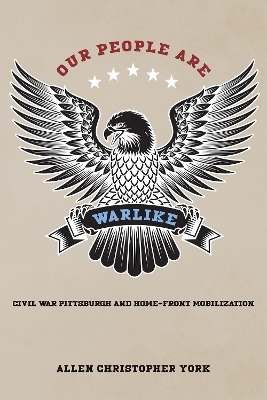
Our People Are Warlike
Civil War Pittsburgh and Home-Front Mobilization
Seiten
2024
University of Tennessee Press (Verlag)
978-1-62190-825-8 (ISBN)
University of Tennessee Press (Verlag)
978-1-62190-825-8 (ISBN)
Provides a significant contribution to the scholarship of both the Civil War and the city of Pittsburgh, adding to the growing historiography of regional and community studies of the war.
“Let our citizens organize and drill,” urged the editor of the Pittsburgh Gazette in September 1862 as rumors of a Confederate attack on the North grew louder. Bank president John Harper, chair of the city’s Committee of Home Defense, confirmed Pittsburgh was ready to repel any raid: “Our people . . . are warlike,” he averred. The Keystone State played an indispensable role in the Federal war effort, and Pittsburgh does not fit the common “brother-on-brother” historiographical theme, which emphasizes divided loyalties between Federal and Confederate supporters. This volume argues that overwhelmingly pro-Union fervor—which cut across class, ethnic, and gender lines—mobilized the city for the war effort.
From its establishment as a frontier village, Pittsburgh evolved on a cultural path divergent from that of both the Northeast and the towns developing farther west. The city entered the war with close economic ties to the East, West, and South, yet also stood apart from them—too small to assume the political positions of cities like New York or Philadelphia that represented greater ethnic and class conflict and much greater tension over secession—yet large enough to manifest the complex institutions and systems of an urban center.
This book represents a significant contribution to the scholarship of both the Civil War and the city of Pittsburgh, adding to the growing historiography of regional and community studies of the war. With abundant illustrations of local people and places, research on Pittsburgh’s geographic importance and extensive industrial output, this book also provides compelling details on Black citizens’ efforts to oppose slavery, ultimately through their service in the Union Army. Civil War Pittsburgh was unique: its distinctive geography, politics, and economy set the conditions for ordinary citizens to directly participate in the war in myriad ways that connected the experiences of the battlefield and the home front.
“Let our citizens organize and drill,” urged the editor of the Pittsburgh Gazette in September 1862 as rumors of a Confederate attack on the North grew louder. Bank president John Harper, chair of the city’s Committee of Home Defense, confirmed Pittsburgh was ready to repel any raid: “Our people . . . are warlike,” he averred. The Keystone State played an indispensable role in the Federal war effort, and Pittsburgh does not fit the common “brother-on-brother” historiographical theme, which emphasizes divided loyalties between Federal and Confederate supporters. This volume argues that overwhelmingly pro-Union fervor—which cut across class, ethnic, and gender lines—mobilized the city for the war effort.
From its establishment as a frontier village, Pittsburgh evolved on a cultural path divergent from that of both the Northeast and the towns developing farther west. The city entered the war with close economic ties to the East, West, and South, yet also stood apart from them—too small to assume the political positions of cities like New York or Philadelphia that represented greater ethnic and class conflict and much greater tension over secession—yet large enough to manifest the complex institutions and systems of an urban center.
This book represents a significant contribution to the scholarship of both the Civil War and the city of Pittsburgh, adding to the growing historiography of regional and community studies of the war. With abundant illustrations of local people and places, research on Pittsburgh’s geographic importance and extensive industrial output, this book also provides compelling details on Black citizens’ efforts to oppose slavery, ultimately through their service in the Union Army. Civil War Pittsburgh was unique: its distinctive geography, politics, and economy set the conditions for ordinary citizens to directly participate in the war in myriad ways that connected the experiences of the battlefield and the home front.
Allen Christopher York is assistant professor of history at Liberty University. He completed his PhD at the University of Tennessee, Knoxville, following a distinguished military career.
| Erscheinungsdatum | 05.12.2023 |
|---|---|
| Verlagsort | Chicago |
| Sprache | englisch |
| Maße | 152 x 229 mm |
| Gewicht | 272 g |
| Themenwelt | Sachbuch/Ratgeber ► Geschichte / Politik ► Regional- / Landesgeschichte |
| Geschichte ► Allgemeine Geschichte ► Neuzeit (bis 1918) | |
| Geisteswissenschaften ► Geschichte ► Regional- / Ländergeschichte | |
| Geschichte ► Teilgebiete der Geschichte ► Militärgeschichte | |
| ISBN-10 | 1-62190-825-9 / 1621908259 |
| ISBN-13 | 978-1-62190-825-8 / 9781621908258 |
| Zustand | Neuware |
| Haben Sie eine Frage zum Produkt? |
Mehr entdecken
aus dem Bereich
aus dem Bereich
Giordano Bruno - ein ketzerisches Leben
Buch | Hardcover (2024)
C.H.Beck (Verlag)
CHF 41,85
das dramatische 16. Jahrhundert
Buch | Hardcover (2024)
Rowohlt Berlin (Verlag)
CHF 47,60


